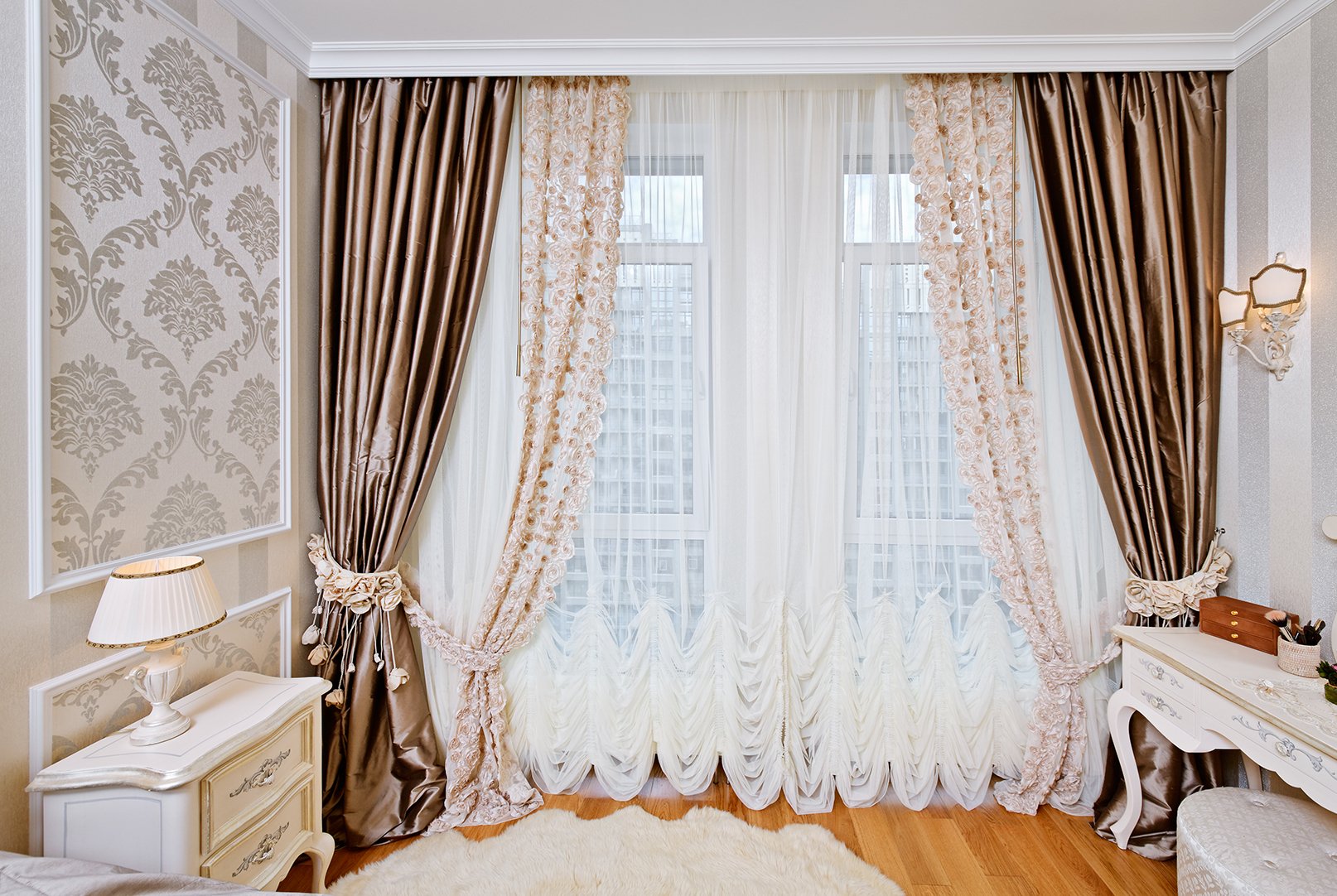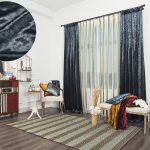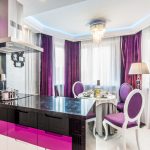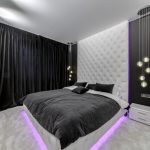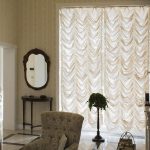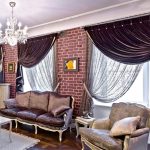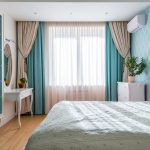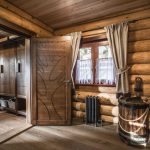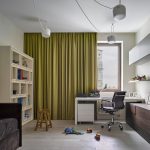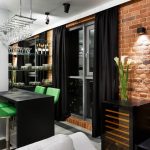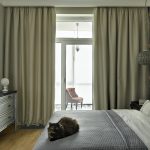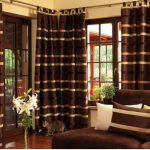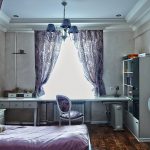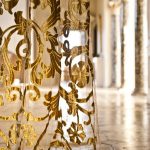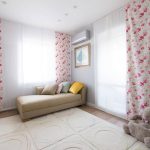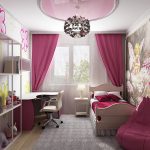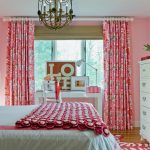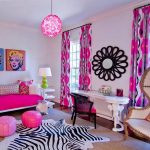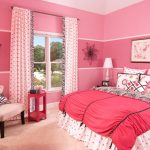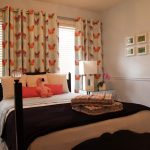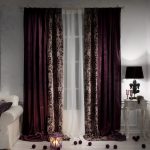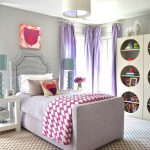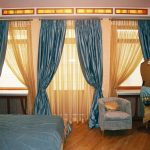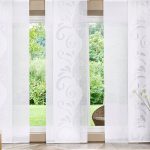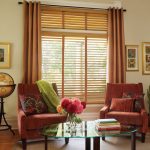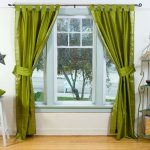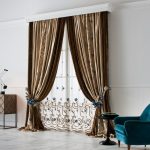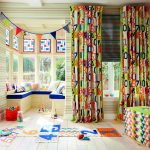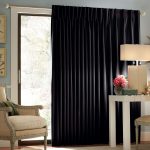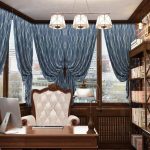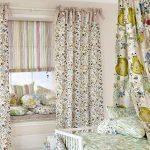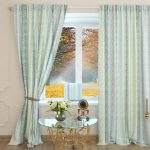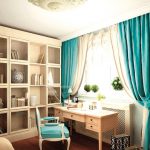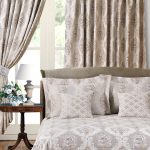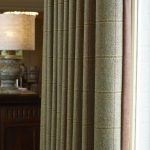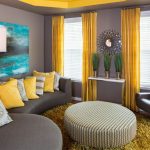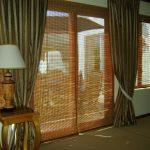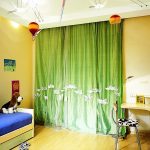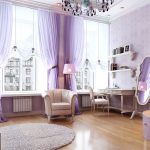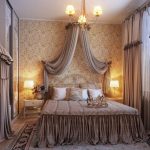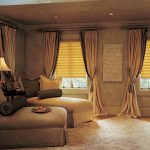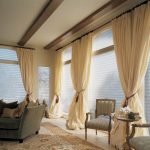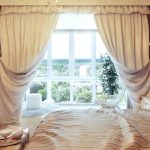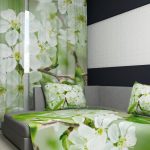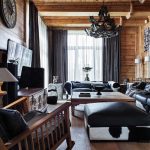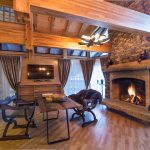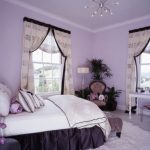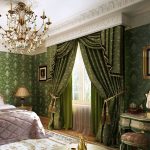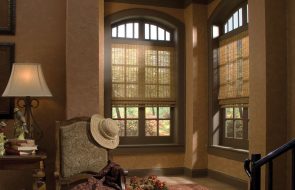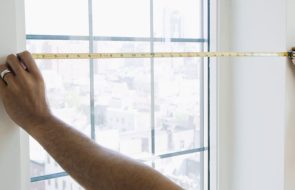The interior design takes on a finished look only after the curtains are hung on the window. They can be thick or transparent, floor-length or window-sill-length, natural or synthetic fabrics.
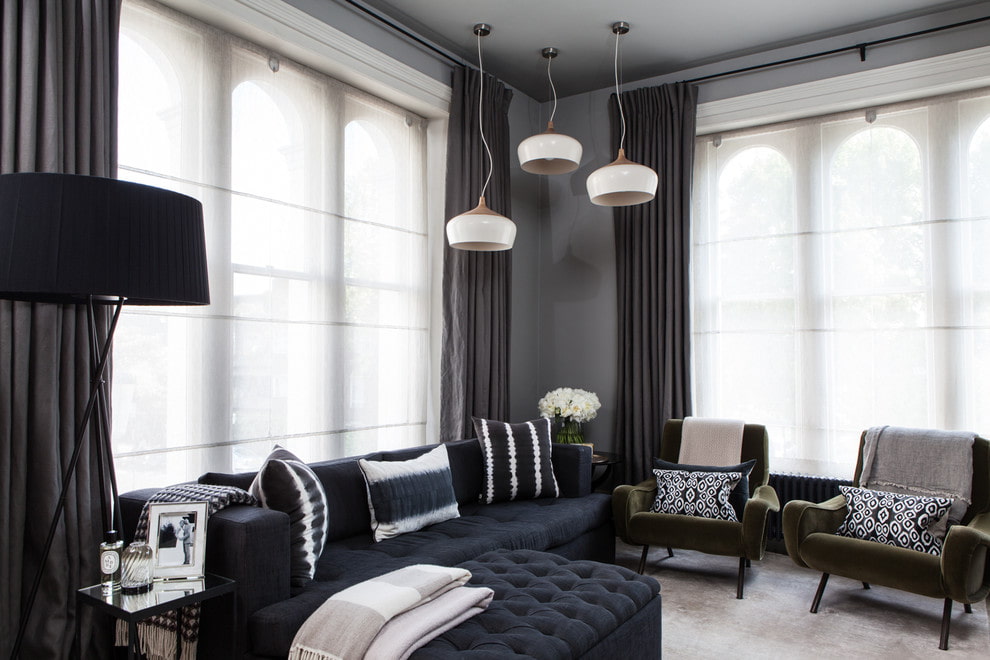
Content
- Window decoration with curtains, what they look like, examples of fabrics
- Types of fabrics for sewing curtains
- How to choose curtains for the living room, recommendations for choosing fabric in combination with the interior, examples of a successful choice, photos
- Methods of fastening curtains, description of how to hang curtains, beautiful examples and photos
- The best photos of the combination of curtain fabric and tulle in the interior
- Conclusion
- VIDEO: Curtains in the interior.
- 50 options for curtains in modern interiors:
Window decoration with curtains, what they look like, examples of fabrics
Designers can explain what a curtain is using the example of a ceremonial palace hall or a theater. Curtains look especially appropriate in classic interiors, but they also perfectly complement the furnishings of rooms in other styles.
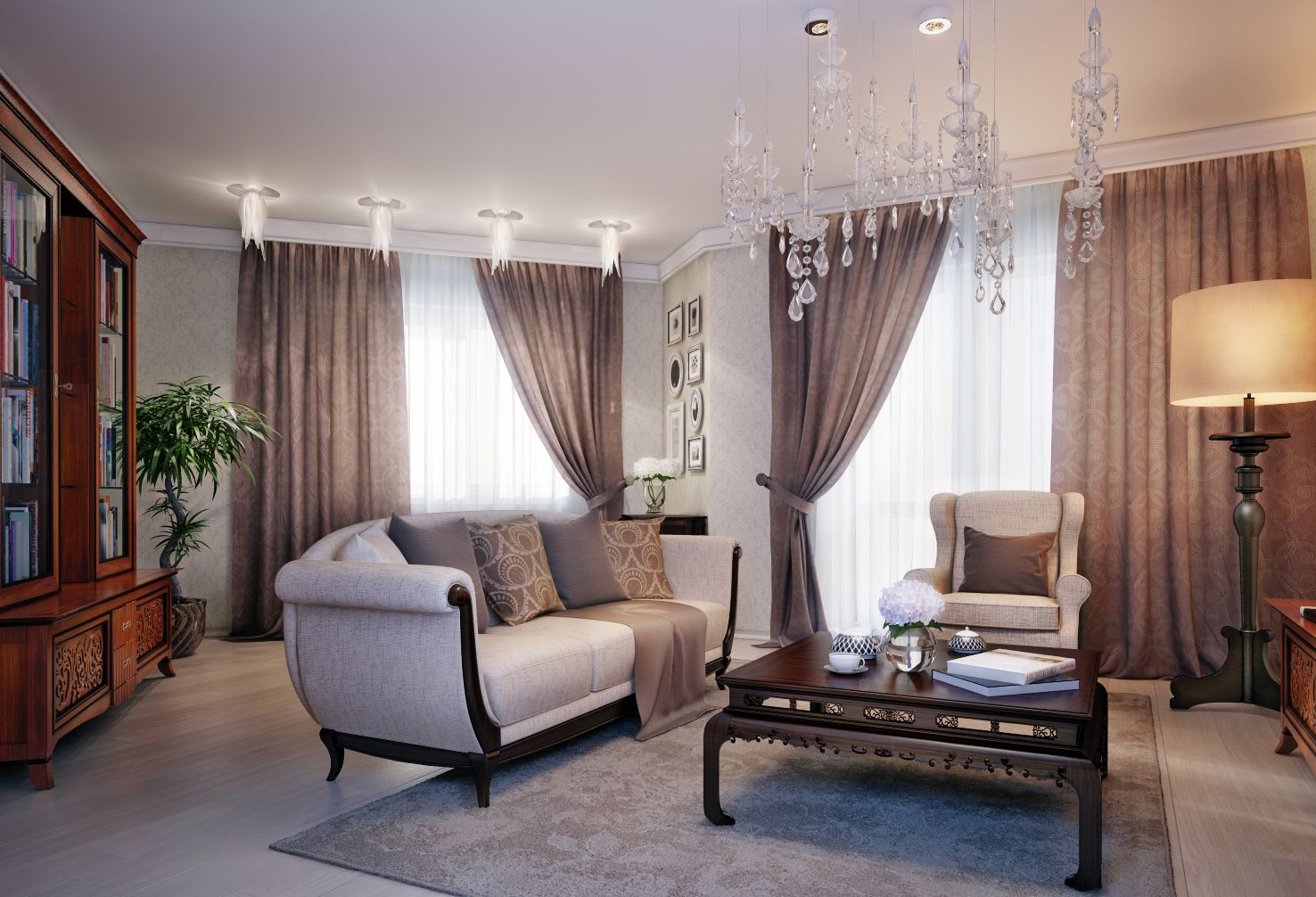
Curtains are combined with different types of curtains, reducing the degree of solemnity or emphasizing the formality of the setting. Their utilitarian purpose is to protect the room from too bright light and hide what is happening in the house from curious glances from outside.
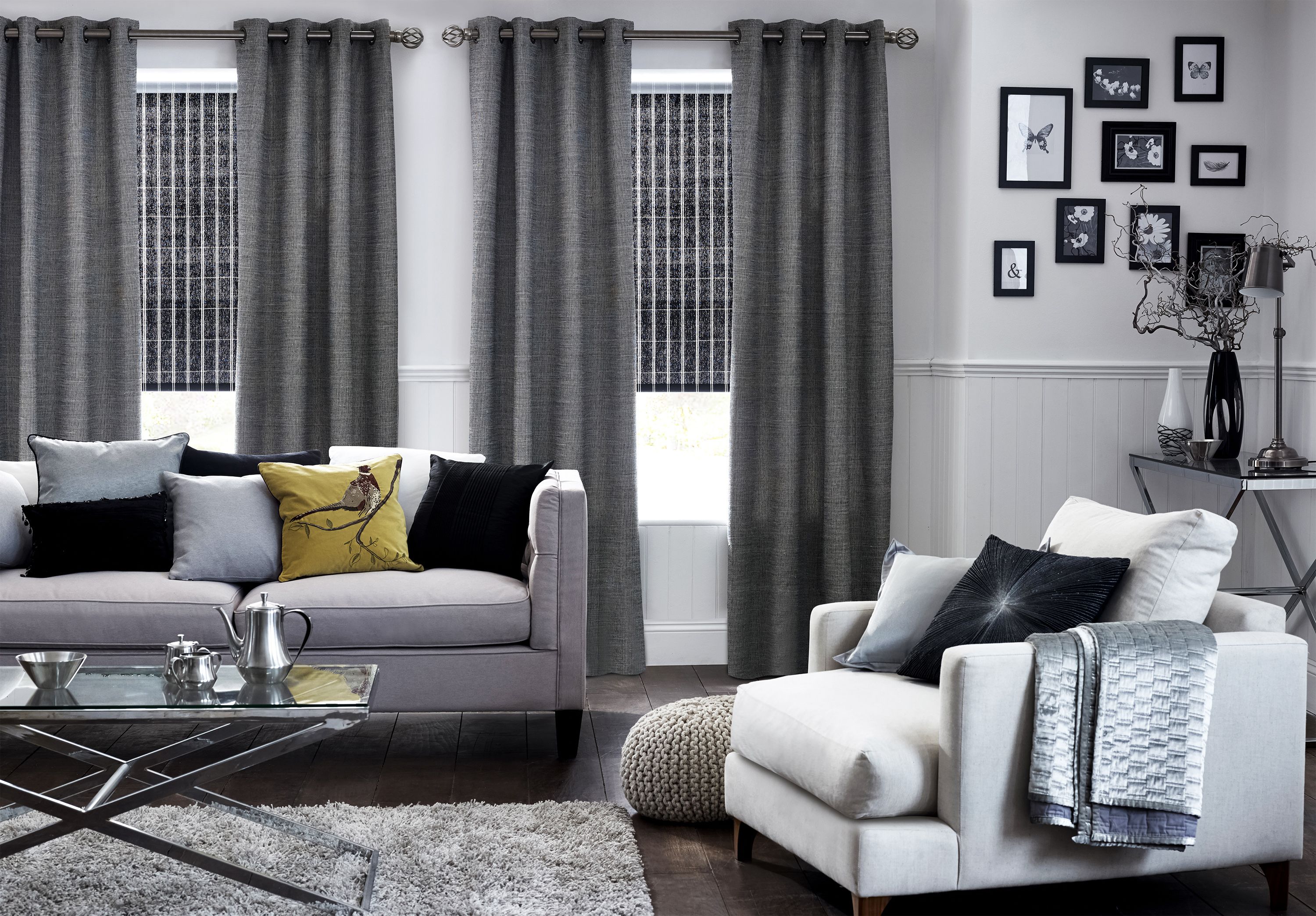
Curtains are most often sewn from thick fabrics, hanging in large folds or laid in complex draperies. Windows in such a frame serve as a decoration of the room. Fabrics are selected beautiful, with pronounced decorative functionality. Previously, thick silks, taffeta, jacquards, linen, velvet, tapestry were used. Now modern materials with special characteristics have become popular.
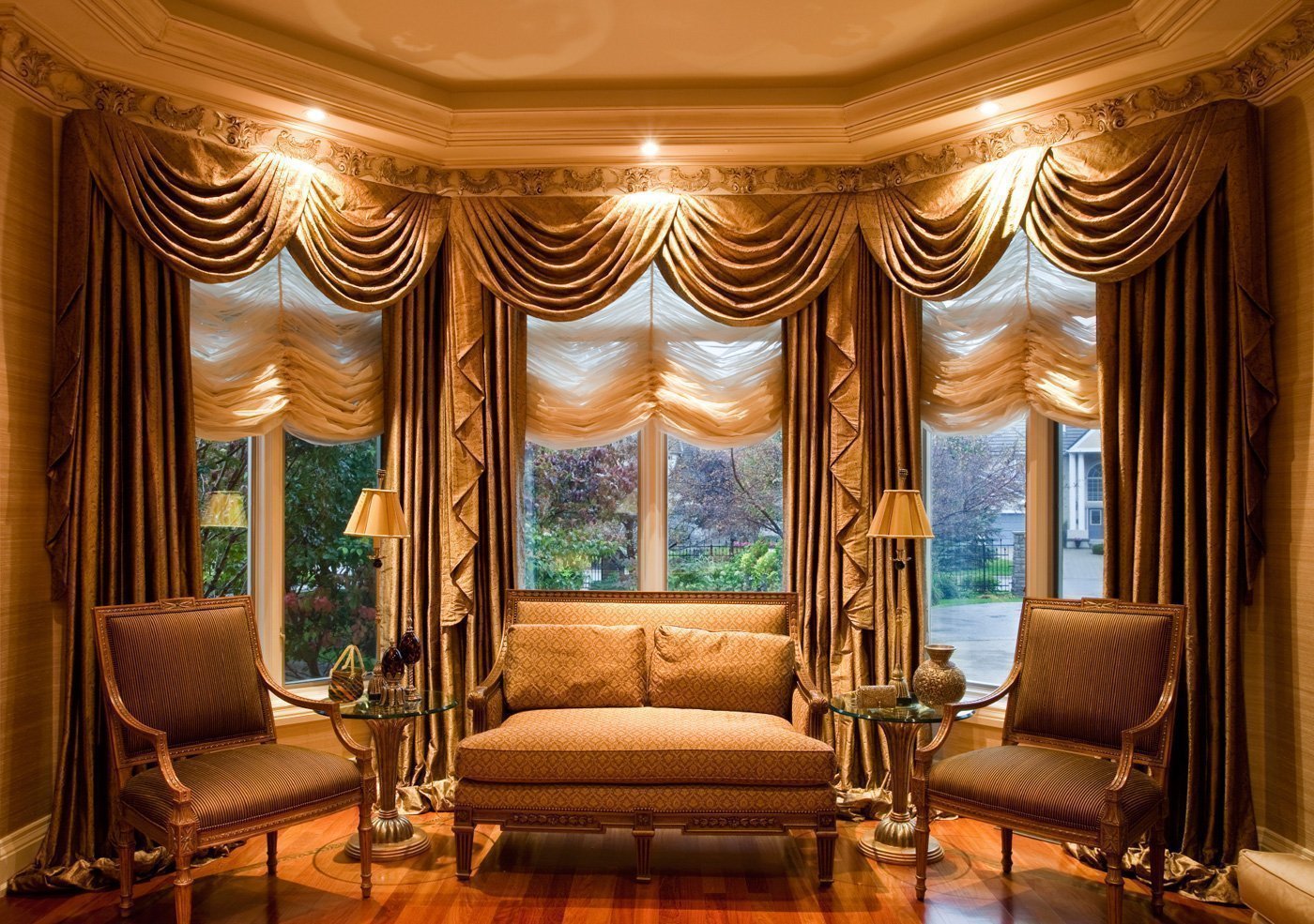
The second layer of drapery on the windows is created by tulle - this is the most common type of curtains. Muslin, chiffon, organza, calico or other light fabrics are selected for them.
Types of fabrics for sewing curtains
Let's look at some of the most popular modern fabrics, giving an idea of what a curtain is.
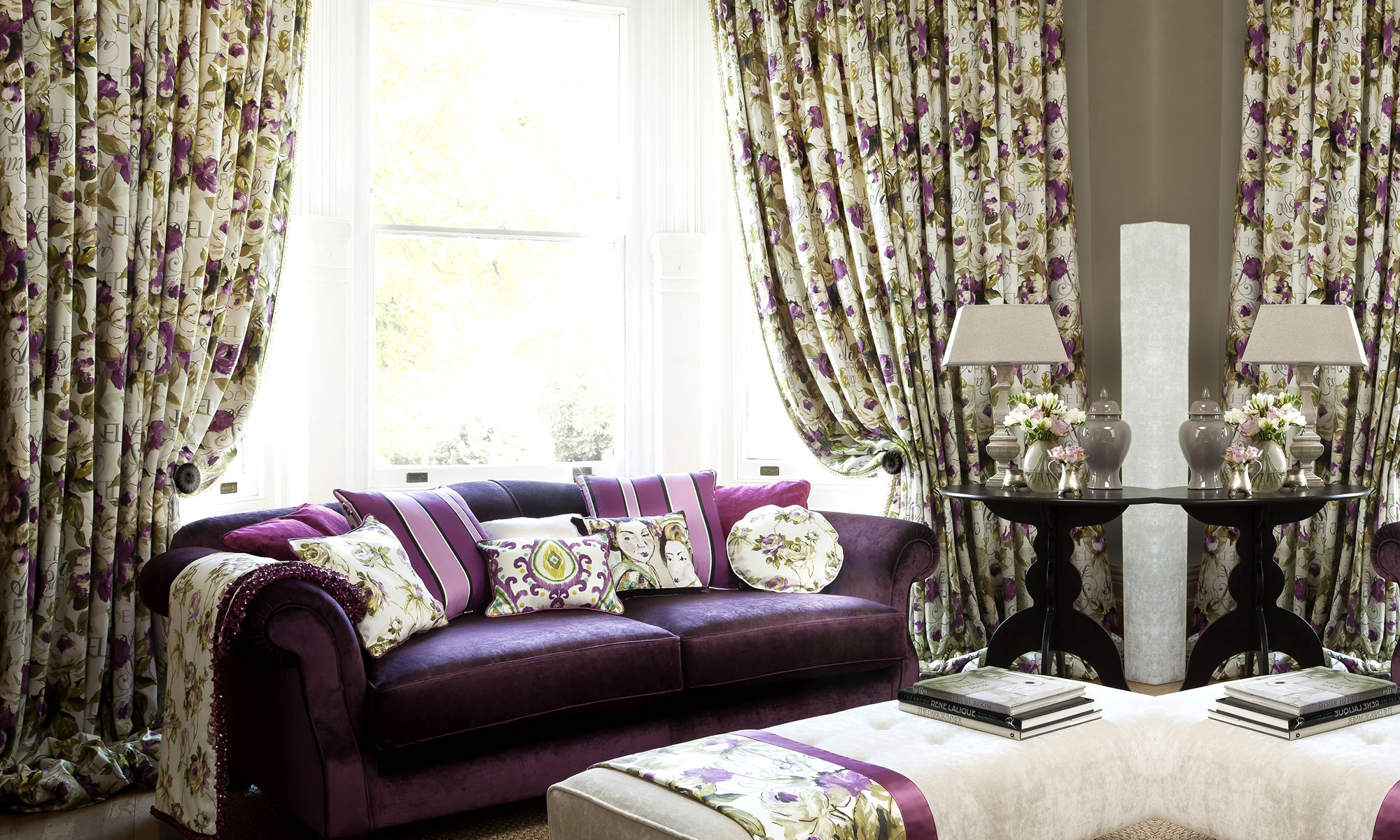
Important! The folds and draperies on such curtains are formed according to the designer's sketch. To close the window, the dense material is not moved from its place, but the pins or cords holding it are loosened.
Blackout fabric for curtains, description, examples
Blackout curtain fabric was invented in Finland, where white nights for almost half a year become a serious problem for lovers of peaceful sleep. Artificial blackout material is made of synthetic fiber polyester (polyester) with the inclusion of viscose. It is three-layered, due to which it has high light-protective characteristics.
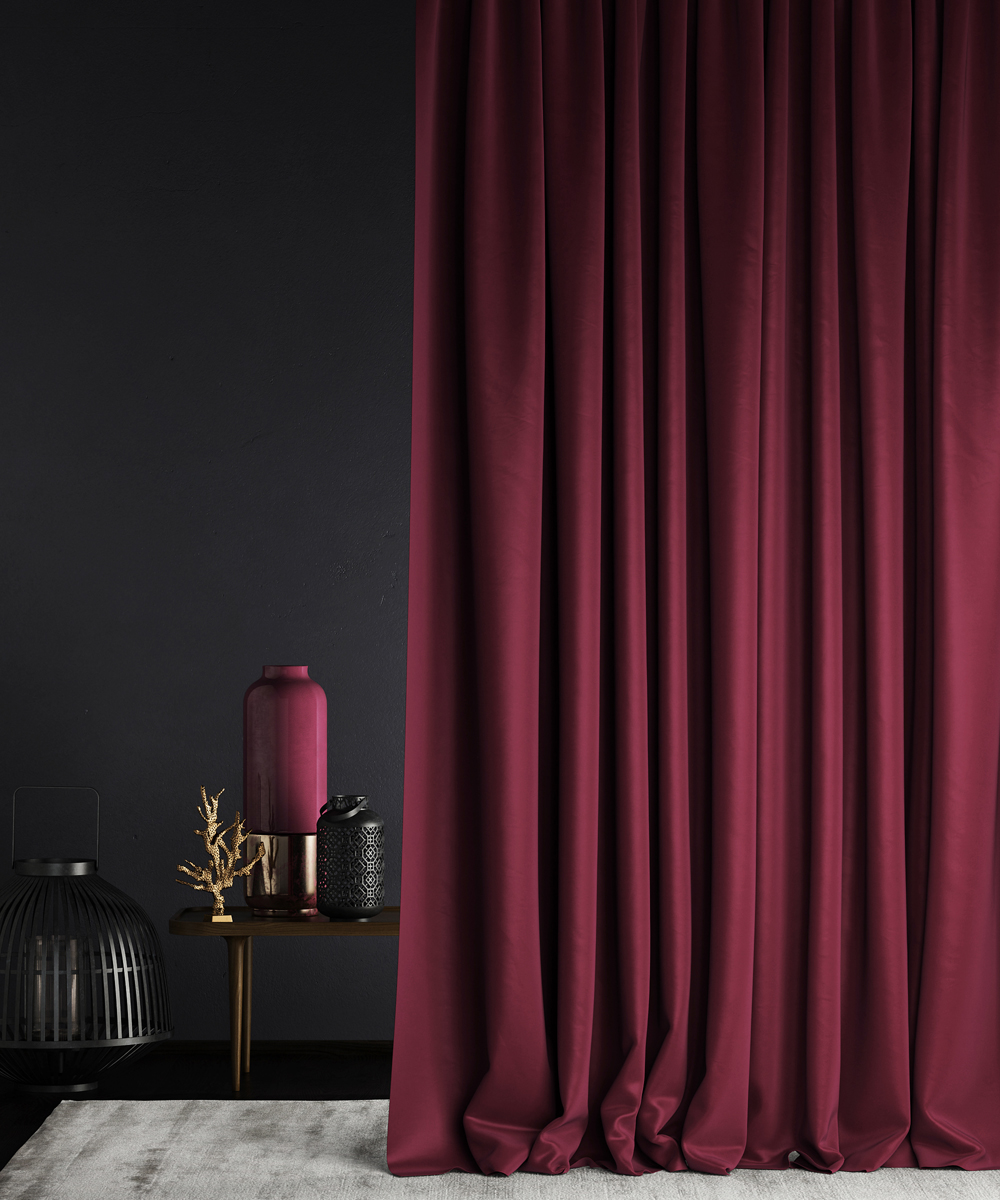
The surface characteristics make this fabric convenient for both solid dyeing and photo printing. The dark collection of blackout curtains Tuscany (from gray to graphite) looks elegant and stylish, while curtains with a pattern, ornament or stripe are more decorative.
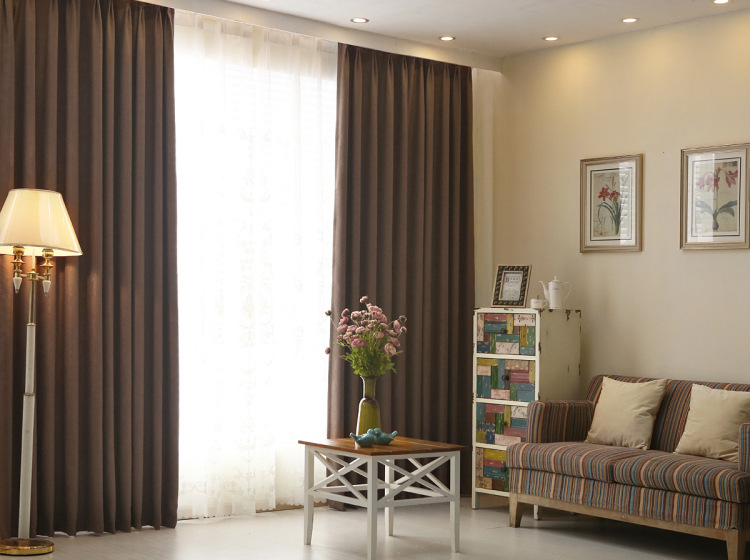
Blackout provides good sound protection, heat insulation, does not burn, but only melts, and does not lose the saturation of shades. The canvas can serve for many years, so you should not choose too bright colors. They quickly become boring, and it will be a pity to part with such curtains.
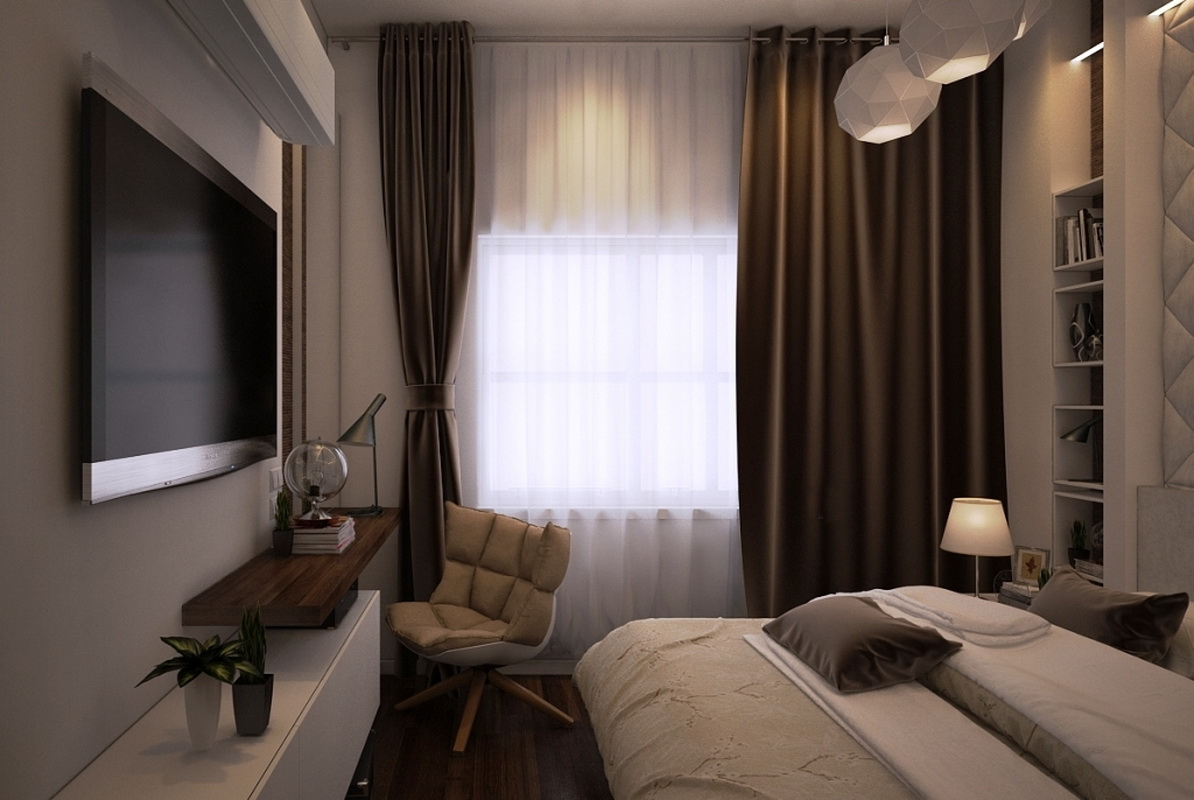
Soft fabric for curtains, what it looks like, photo in the interior
The composition of the artificial fabric soft for curtains is antiallergenic polyester. The fabric is soft, with a velvety surface, with a short pile on the front side and a matte smooth back side. Such materials do not require the mandatory use of a lining when sewing. The pattern can be classic, with an ornament or flowers, modern with graphics or stripes.
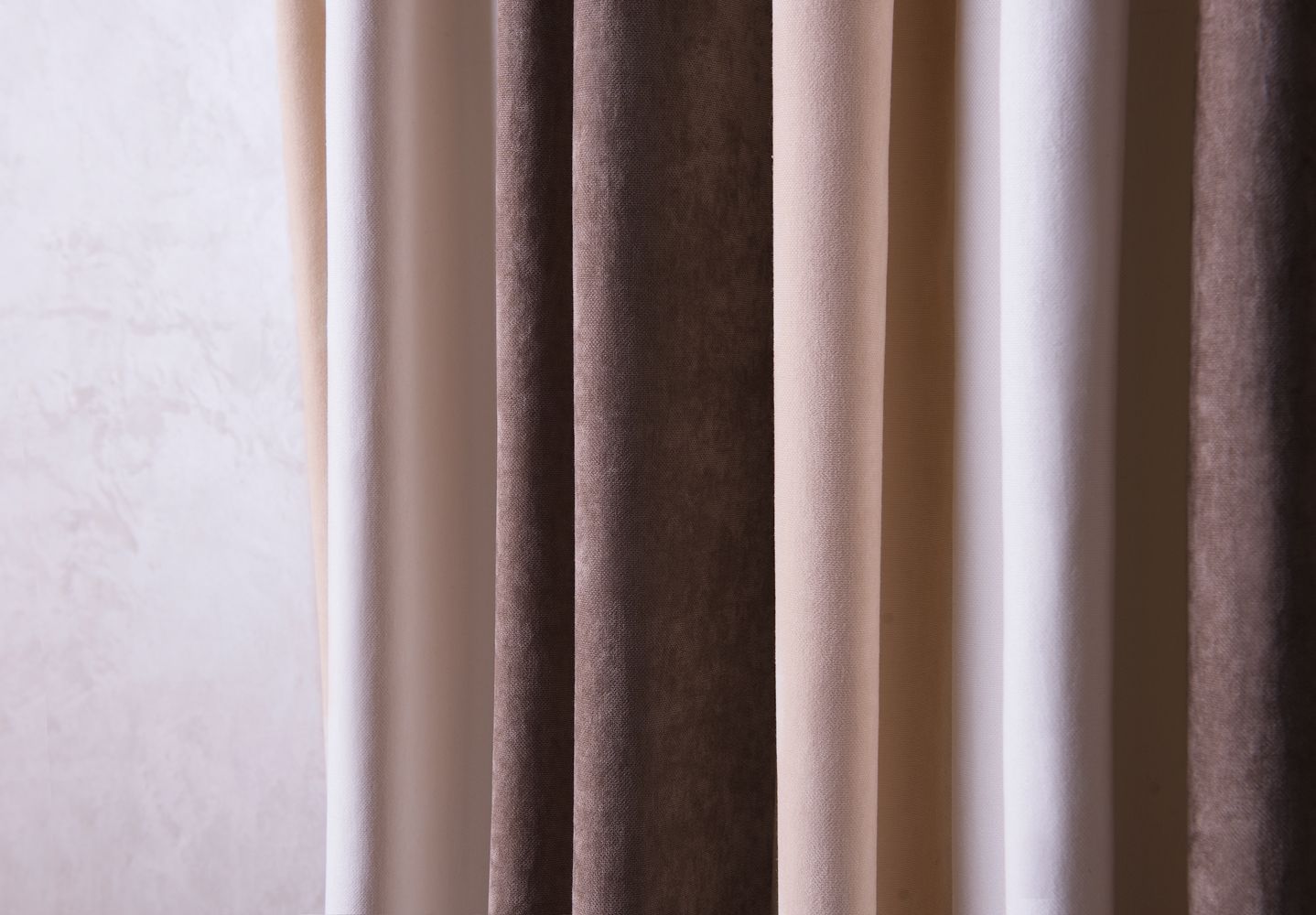
The velour nature of the front surface suggests that the curtains will accumulate dust, but this is a deceptive impression. The material undergoes final dust-repellent impregnation. Due to the dense structure, curtain fabrics do not let in light, and hold up to a third of the sound flow. The texture helps to create beautiful draperies.
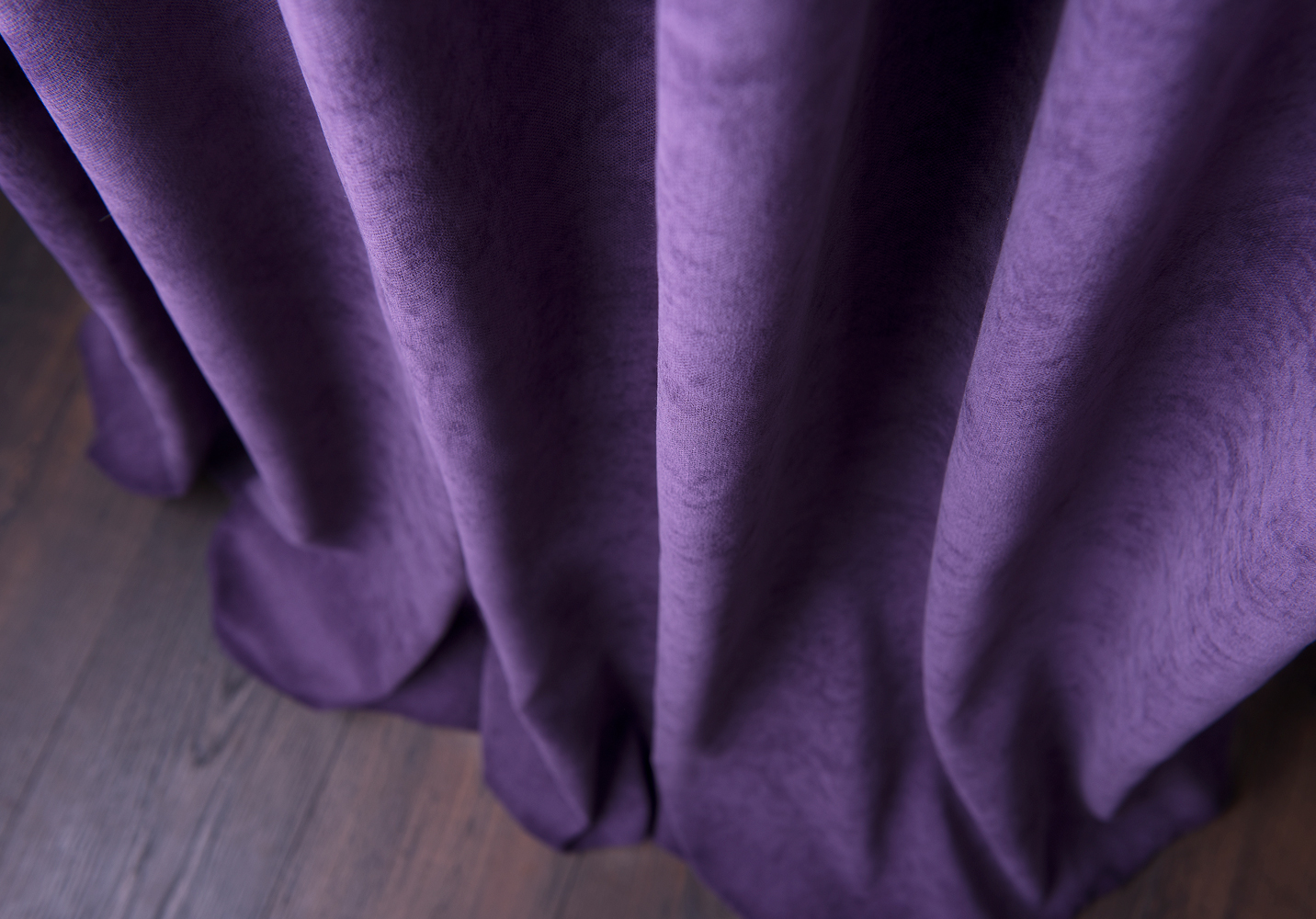
Reviews of people who have hung such curtains in the living room or bedroom positively evaluate curtains made of soft Said fabric. They are easy to wash at home, and fit perfectly into both classic and modern interior styles.
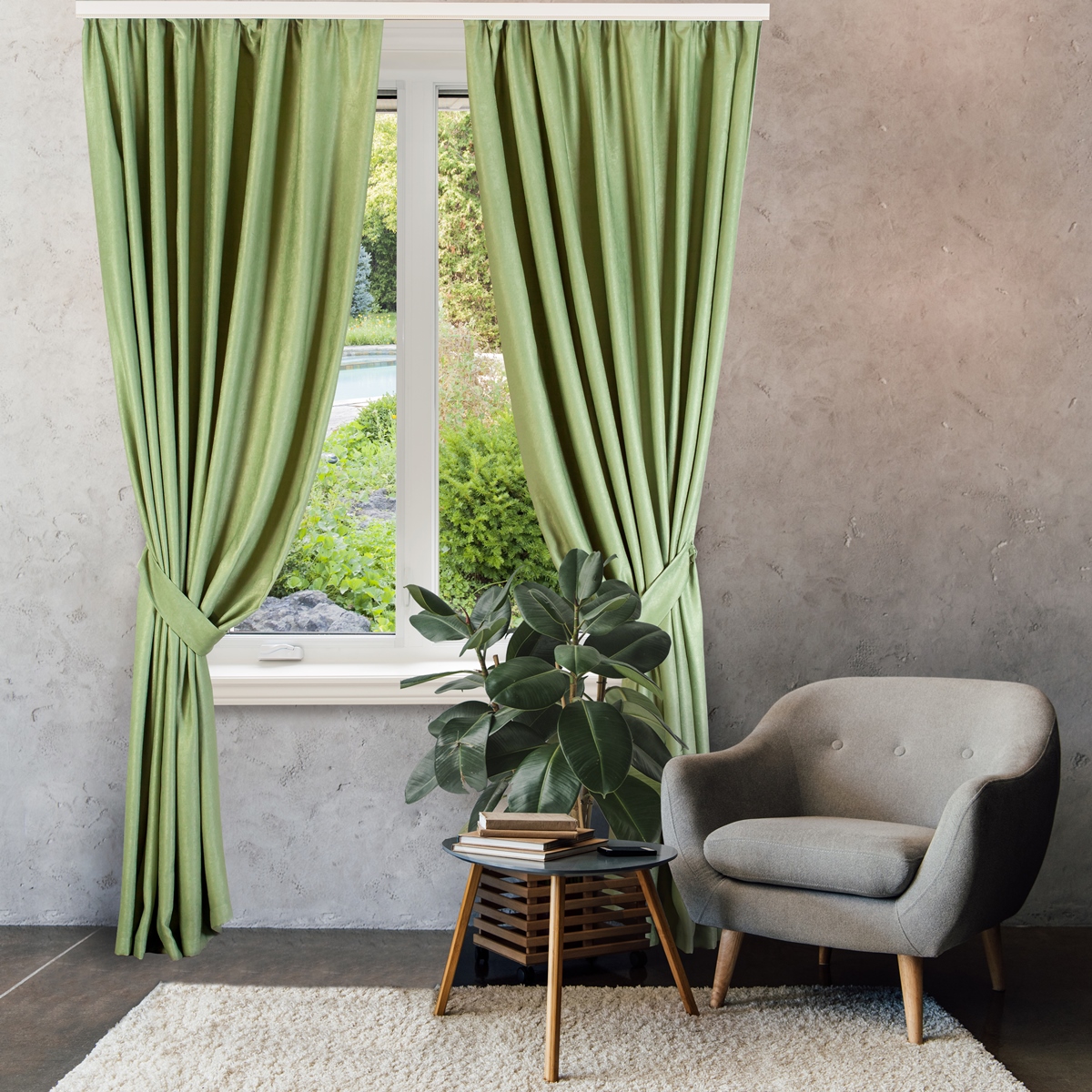
Jacquard fabric, description, photos and examples in the interior
Jacquard is a mixed fabric (natural plus synthetic fibers), which is produced immediately with a pattern created by interlacing threads. This decor looks textured and resembles hand-woven tapestries. The patterns can be anything, but the main motifs are floral. Jacquards fit perfectly into classic interiors, Provence, Art Nouveau, Empire or Country styles.
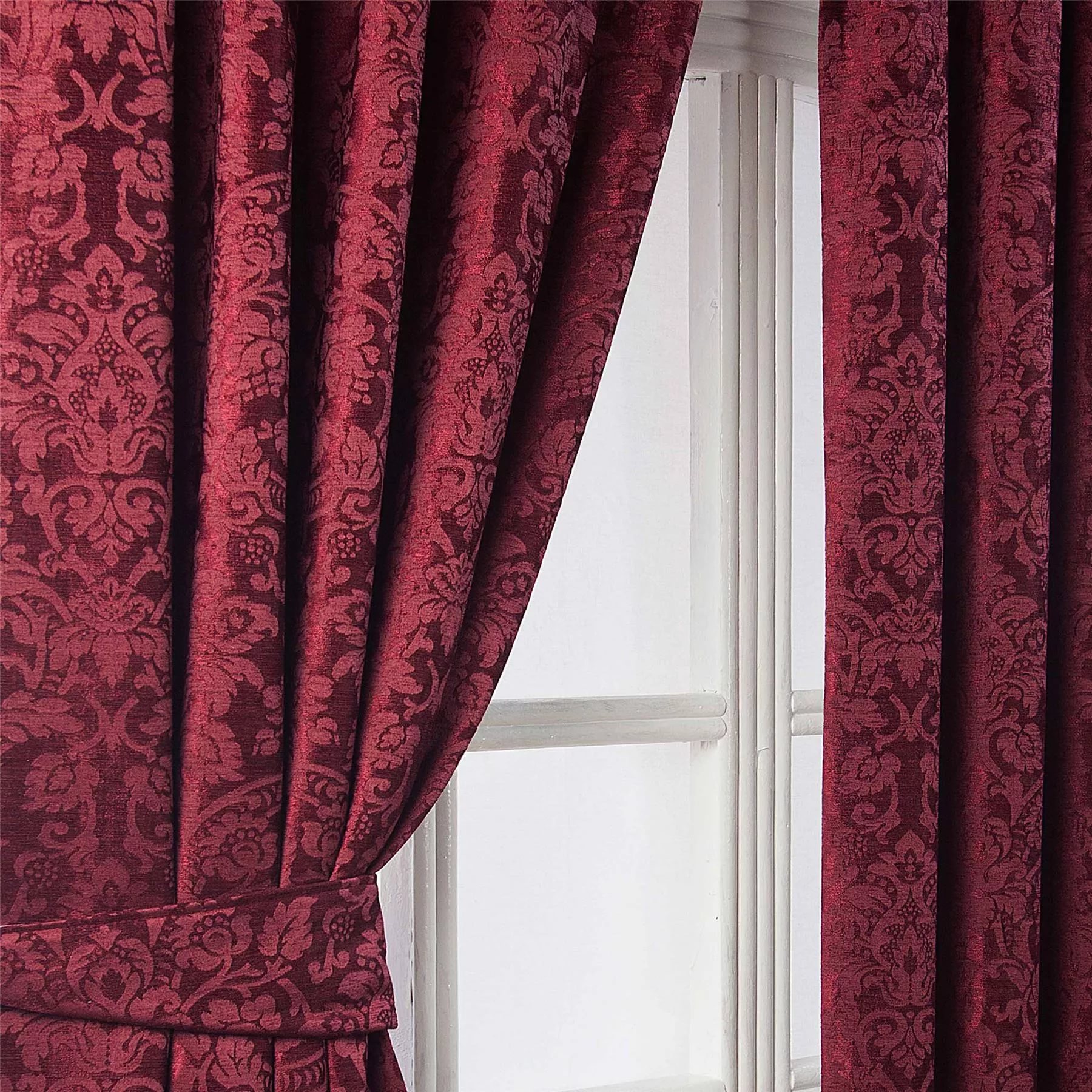
Jacquard is quite dense, but does not create complete darkening, leaving a natural twilight with fully closed curtains during the day and perfectly darkening the bedroom at night. Such curtains go well with paintings on the walls, are suitable for a billiard room or dining room, and will decorate the living room.
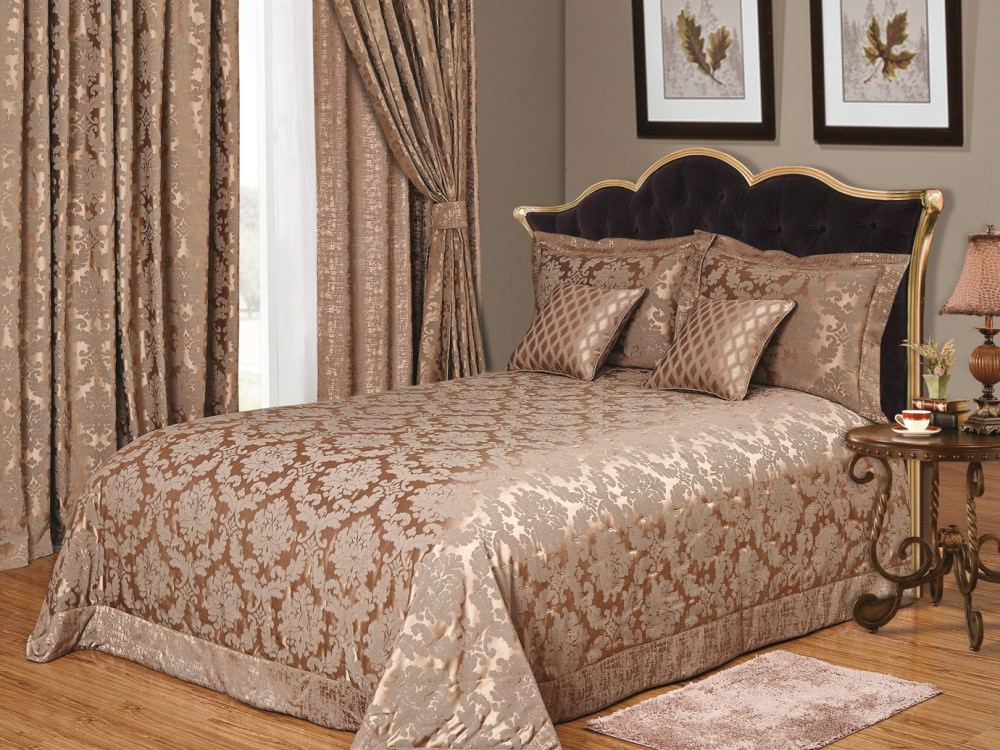
Jacquard does not have flashy, acidic colors. The tones of this material can be saturated, but not sharp. Designers often use cords, tassels, and braid as decoration.
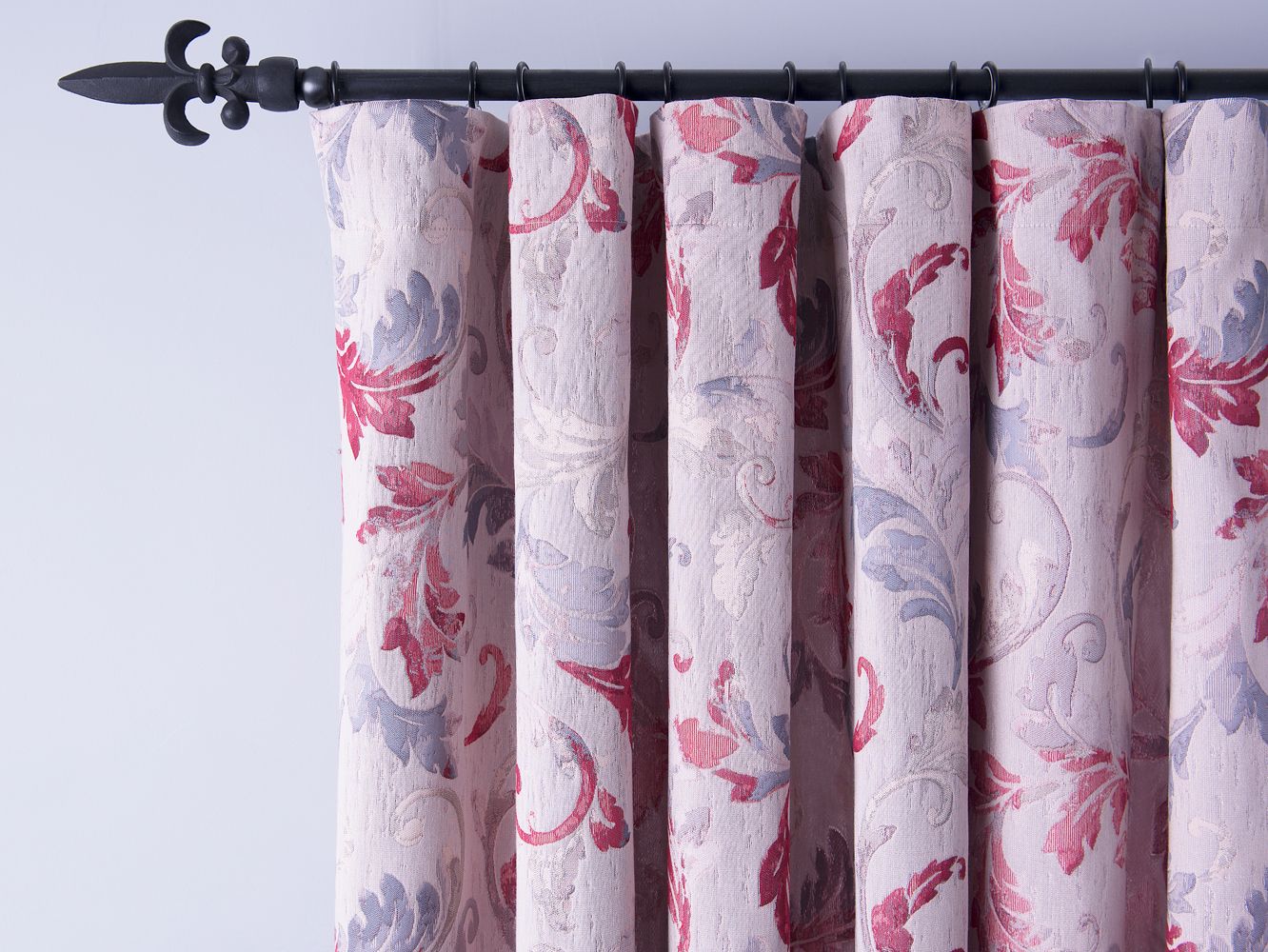
Chenille fabric, description, photo
Chenille curtain fabric is so durable that it is often used even in the production of upholstered furniture, where particularly high wear resistance is required. Thanks to the short and soft pile on the front side, it is very soft to the touch, from a distance it gives the impression of suede.
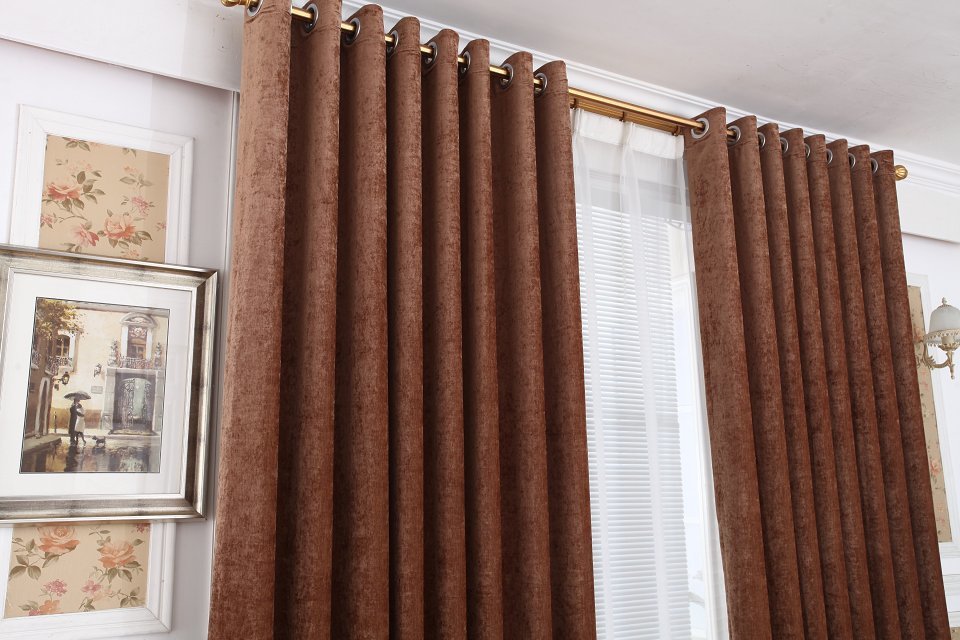
Thanks to its velvety texture, chenille absorbs sounds coming into the window from the outside. The degree of opacity depends on the color of the canvas - dark ones retain sunlight better, light ones let in some of the light flow.
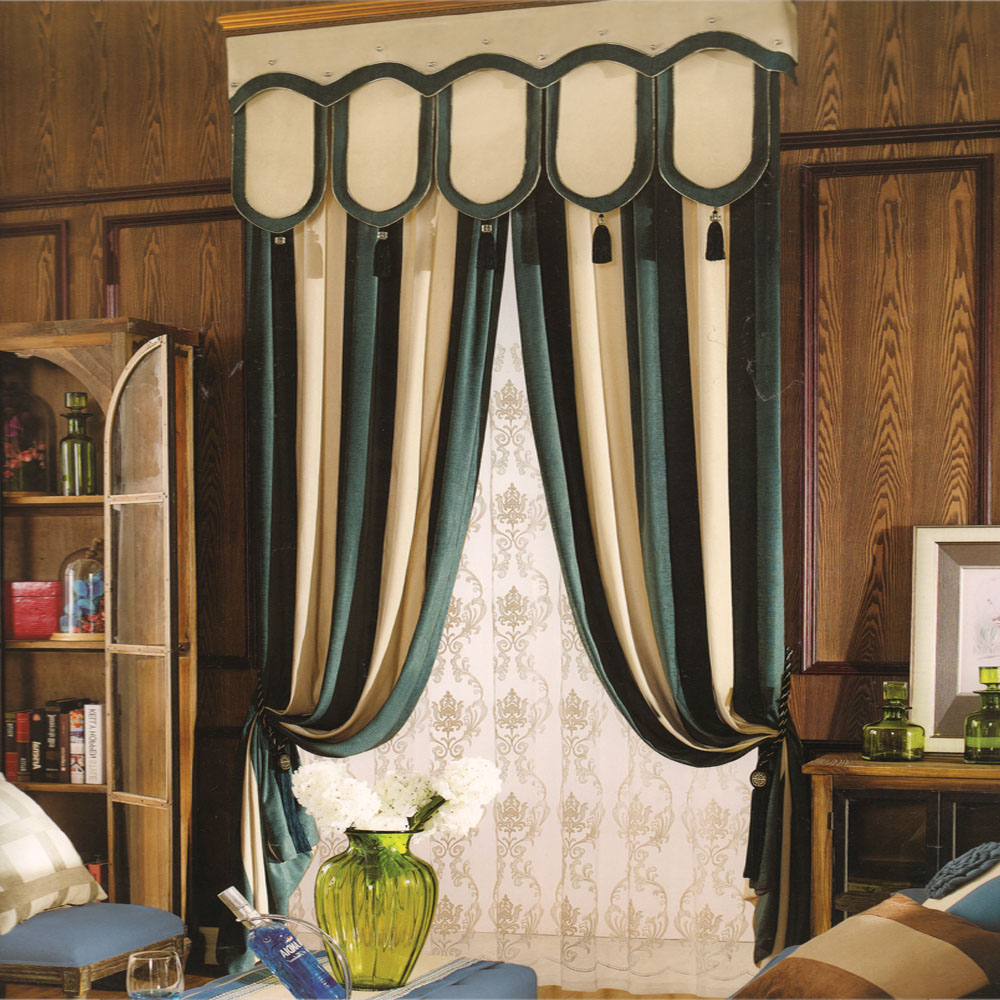
The advantages of chenille include easy care (the fabric does not shrink or warp after washing). A wide color palette and a large selection of decor and patterns make it possible to choose curtains for rooms of any purpose and style.
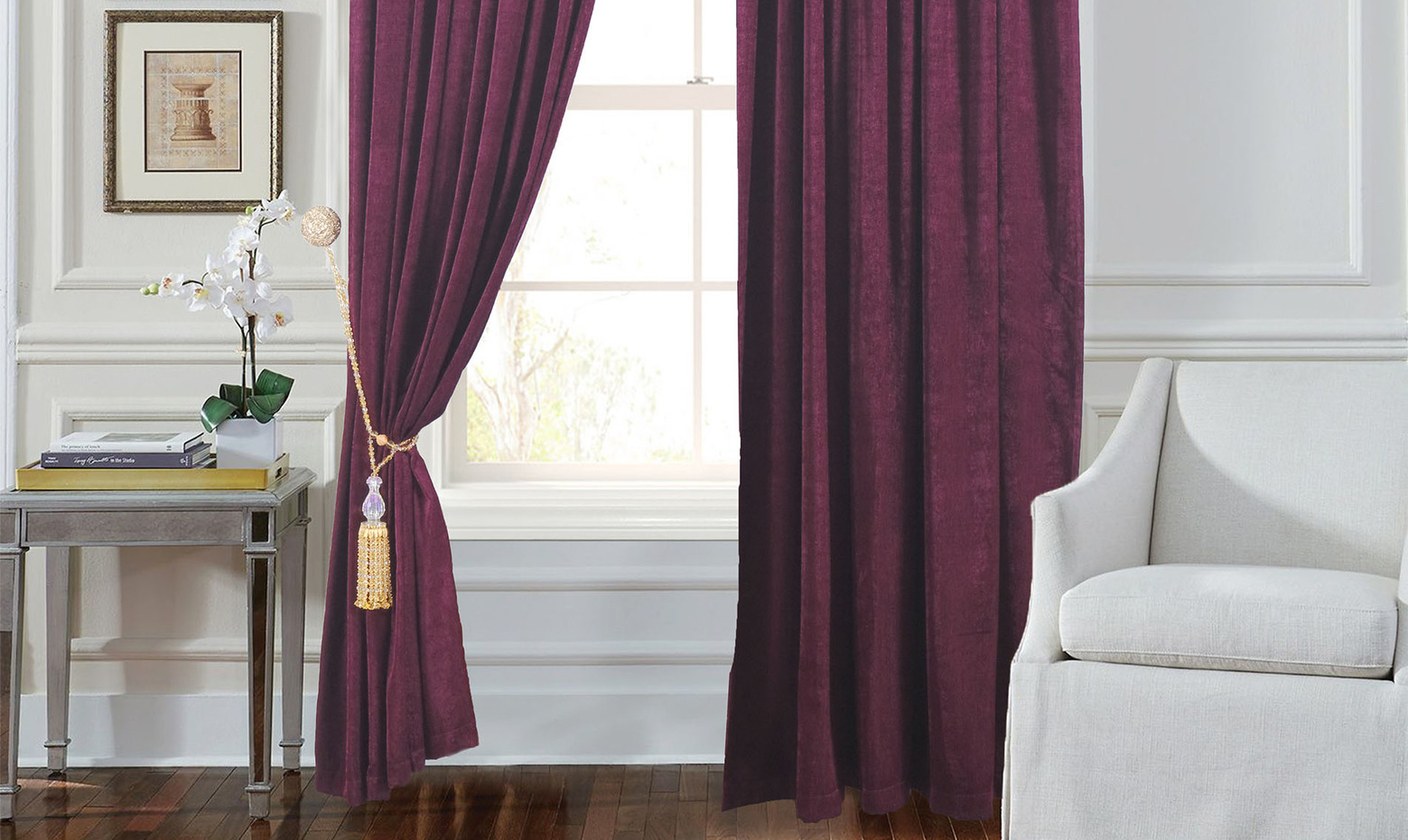
How to choose curtains for the living room, recommendations for choosing fabric in combination with the interior, examples of a successful choice, photos
Designers pay a lot of attention to window decor, as curtains are not only a functional element, but a bright accent in the interior of any room. They can make the atmosphere more solemn and aristocratic, or simplify and democratize it. Without curtains, the window looks bare, and the room seems uncomfortable.
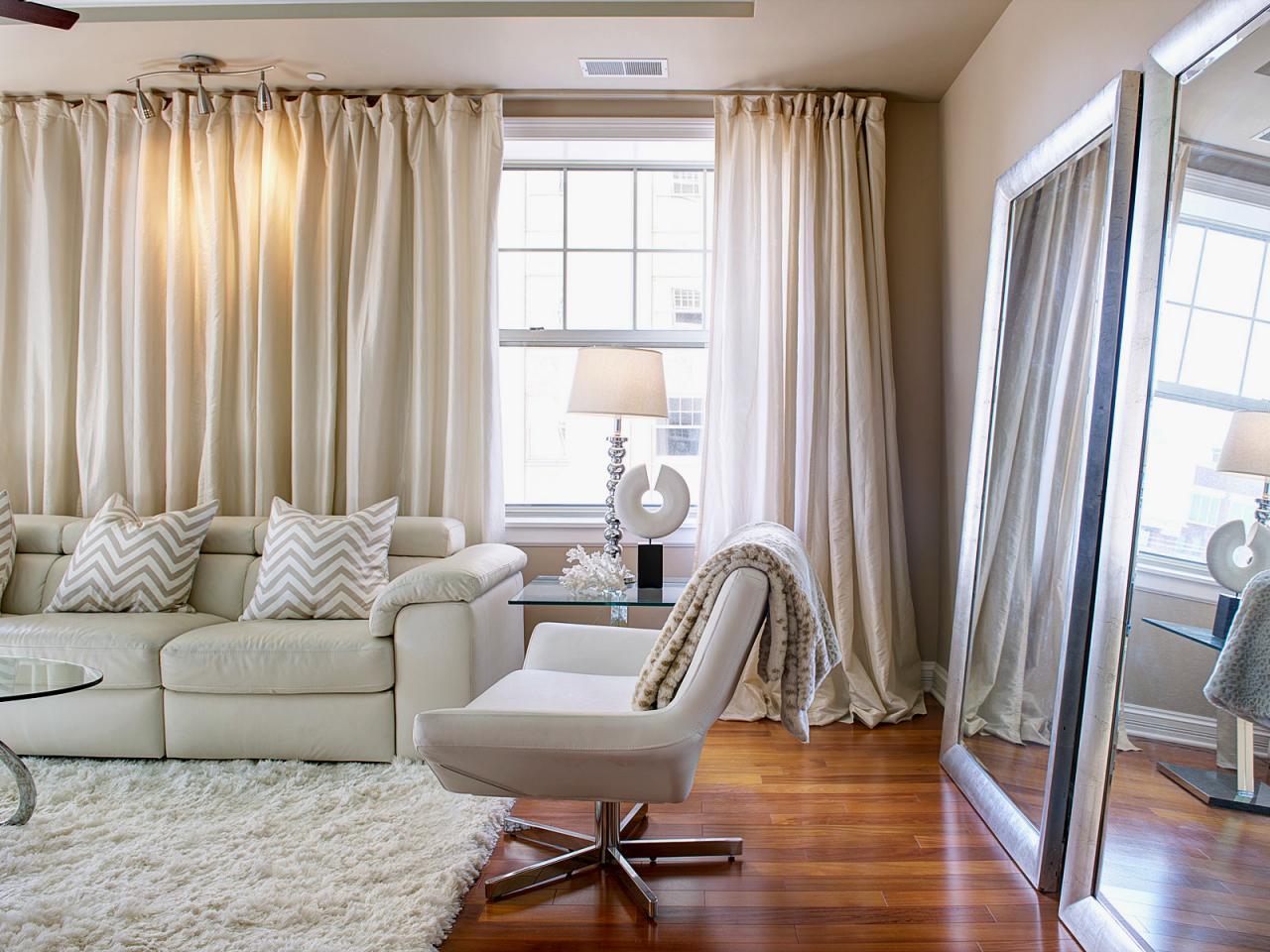
Dense materials are suitable for classic design styles, rococo, baroque, empire, art deco. This option is good for spacious rooms with high ceilings and large windows. Fabrics - heavy jacquard, blackout, soft, chenille. In this case, you cannot do without a lambrequin, complex structures of grabs and an abundance of draperies.
Lighter curtains will decorate a room in the Provencal, romantic or modern style. With it, tassels, ribbons for holding folds, fringe, festoons and flounces along the edge are used. Good materials: light jacquard, chenille, soft. Transparent silks, satin, tulle will help to expand the space. An original technique is an asymmetrical arrangement of the position, only on one side of the window opening.
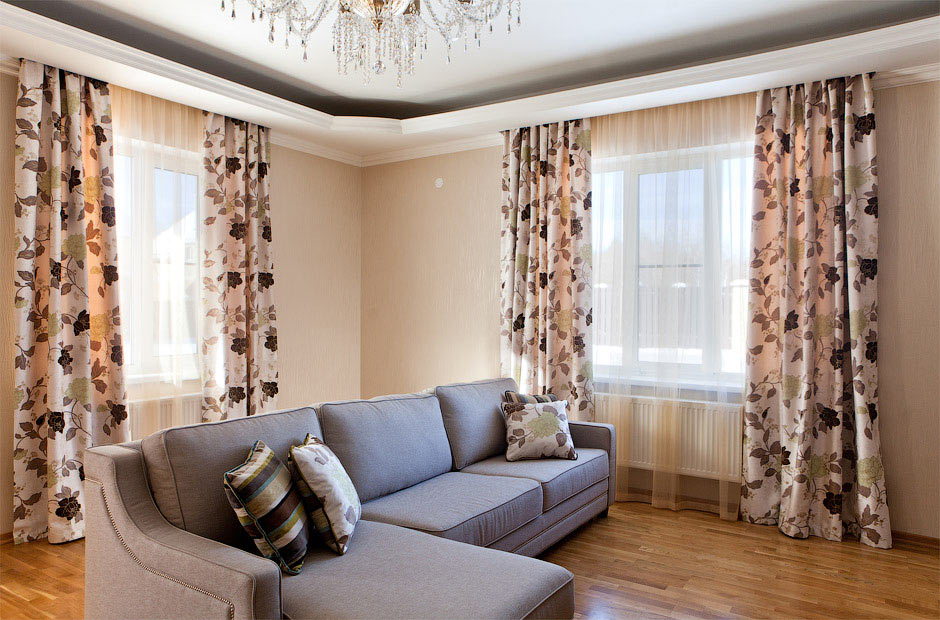
For interiors in a modern minimalist design (Japanese style, high-tech), single-color curtains made of chenille, soft, blackout are suitable. Jacquard is not suitable due to its enhanced decorativeness. In this case, an abundance of draperies and trim is not required, deep symmetrical folds are enough.
Methods of fastening curtains, description of how to hang curtains, beautiful examples and photos
Classic cornices are best suited for attaching curtains. They can be made of wood or metal, depending on the overall style of the room. From a technical point of view, a curtain is simply a piece of fabric suspended from a crossbar. There are different ways of attaching fabric to a cornice:
- eyelets;
- loops or rings;
- wings;
- ties;
- braid.
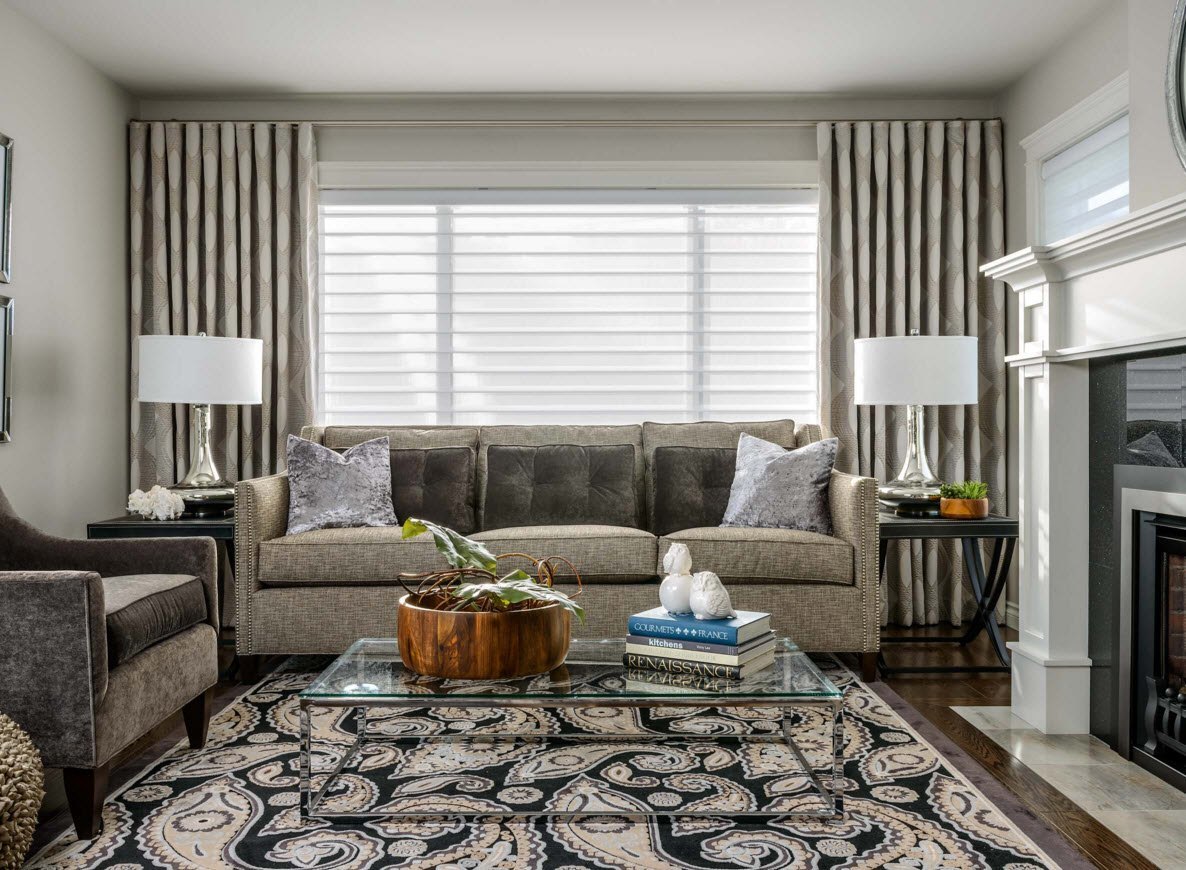
Eyelets are metal rings inserted into special holes in the material. They are strung on the curtain rod and allow the curtain to be moved freely if necessary. They help to create uniform deep folds without effort, and the fasteners are practically invisible.
The loops are sewn into the curtain rod at the top in the same way (as are the rings) and are put on the cornice. Often curtains on loops or rings are supplemented with a lambrequin, which hides the fastening. In this case, to open or close the window, you need to use special magnets-clips or tape that gathers the canvas into folds at the edge of the window opening.
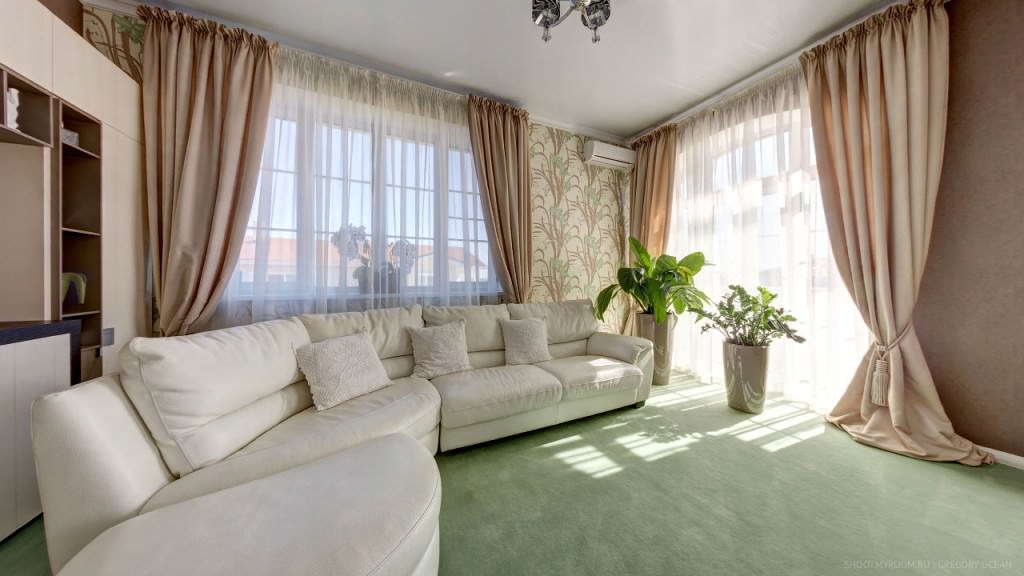
The drawstring is made from the curtain fabric itself by double-folding the top edge. The curtain rod is threaded through it. Such curtains are almost completely silent when moving, unlike curtains with eyelets. The drawstring is not the best choice for curtains with an abundance of drapery; it is more suitable for straight canvases.
Curtain ties are a type of loop. They are also sewn to the top edge and are used to form beautiful decorative bows.
Light curtains can be hung on a tape. This is a special tape that is spread over the upper edge of the canvas, then with the help of a special built-in mechanism from the interlacing of tapes it is gathered into gathers and hung on the cornice by special hooks.
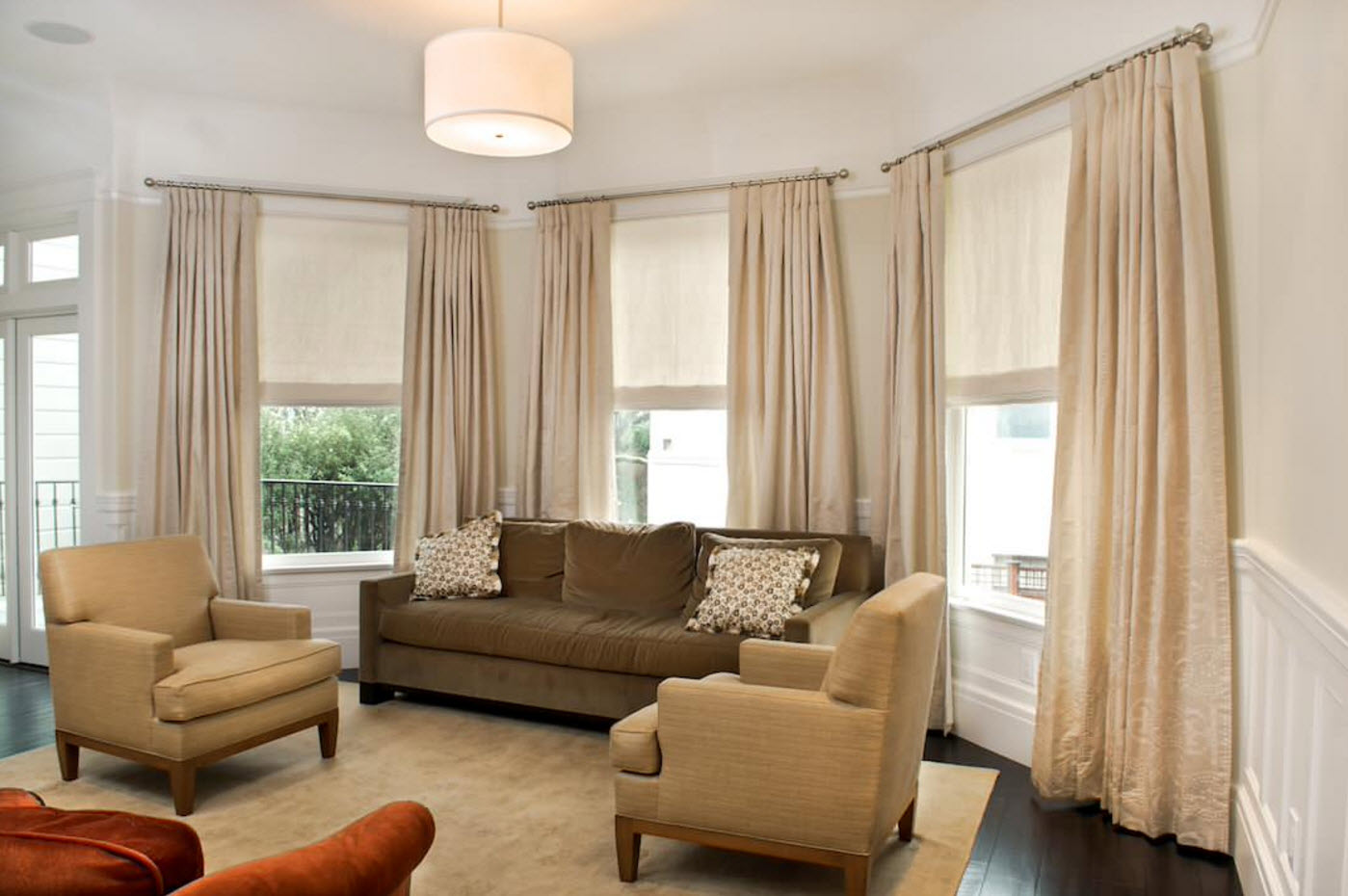
The peculiarity of this method: the hooks for attaching the tape are quite thin and will not support the weight of the dense material.
The choice of the method of fastening curtains depends on the customer's wishes. Often, ready-made options are offered with loops or sewn-on tape. It is worth using the method suggested by professionals, since they have already taken into account the features of the fabric and the method of draping the curtains.
The best photos of the combination of curtain fabric and tulle in the interior
Curtains are quite an expensive item of expenditure in cosmetic repairs of a room. Therefore, when choosing a material, consider the cost, size and durability of the curtains. Curtain fabric from Turkey has a good combination of price and quality, as well as a wide choice of decor and color scheme. Remember that thick curtains will need to be complemented with thin tulle. You should not choose inexpensive material to pair with luxurious jacquard or blackout - this will spoil the whole impression.
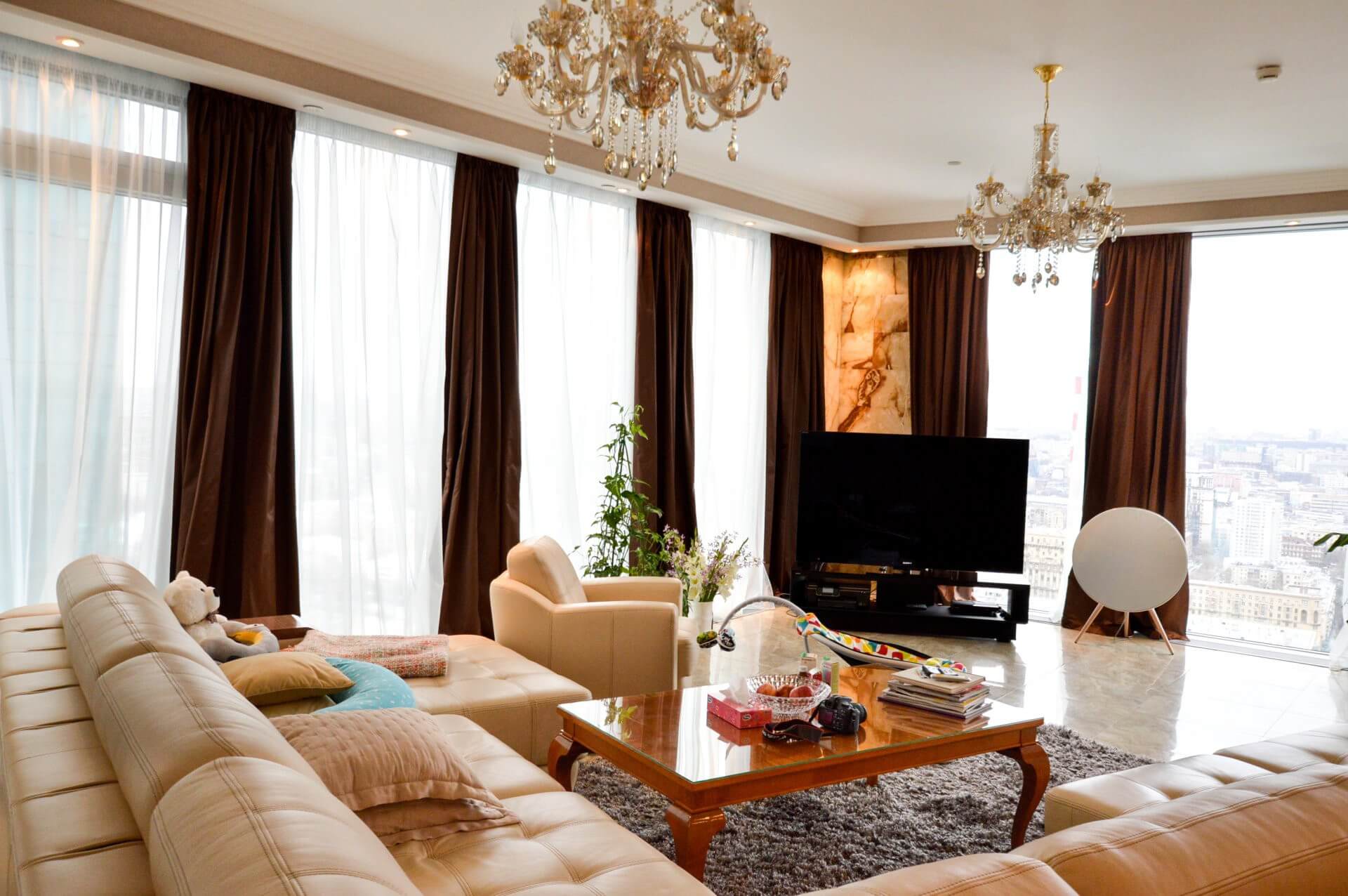
The combination of transparent fabric and dense material is an excellent way to create a composition in a single color scheme, but in different color saturations. A curtain with a pattern and transparent chiffon or organza look good.
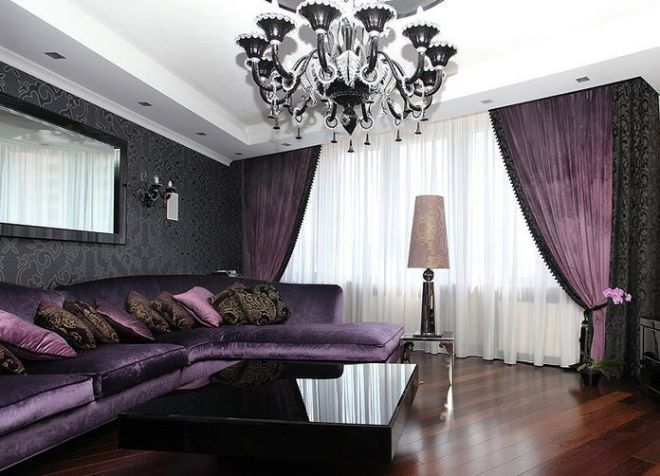
Conclusion
Window design is a task for professionals, but with a careful and thoughtful approach, even an amateur can handle it. You can make curtains yourself, the main thing is to show taste, imagination and accuracy. The definition of this type of curtains can be the density of the fabric, the decorativeness of the texture and the pomp of the draperies. On the other hand, buying a ready-made version at retail is guaranteed to save you from any headaches on this matter. Wholesale deliveries are carried out with discounts.
